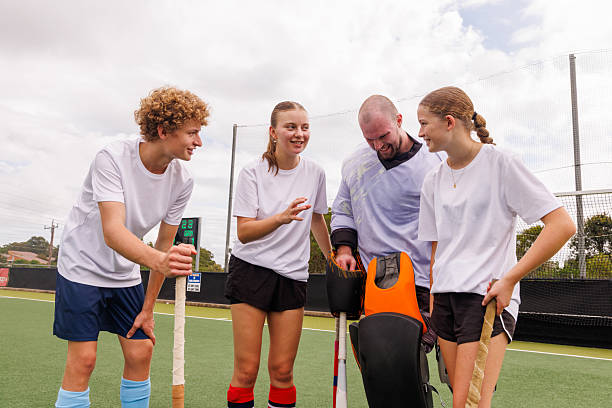Life as a student is a constant juggling act. You’re juggling tough classes, endless assignments, a busy social life, and maybe a part-time job. It’s hard to find a moment to breathe. It’s easy to feel overwhelmed, stressed, and even a little lonely, especially if you’re in a new environment. While some people hit the gym alone, others find their escape in a whole different way: joining a sports club.
Student sports clubs are a special kind of experience. They aren’t just for getting fit or winning. They help build community, find your place, and develop lifelong skills. Joining a club can change your student life. It boosts your physical health, helps you make lifelong friends, and gives you the mental break you need.
The Core Three: Fitness, Friendship, and Fun
Contents
When you ask students why they join a sports club, these three reasons usually top the list. They are the foundation of what makes club sports such a great idea. But let’s look at what each of these really means.
Fitness: A Holistic Approach to a Healthier You
It’s no surprise that playing a sport is great for your body. But the fitness you get from a club goes beyond just a good workout. It’s a holistic approach that builds strength, endurance, and overall well-being.
- Building a Stronger Body: No matter the sport—be it soccer, swimming, or volleyball—you’re using your body in a way that builds muscle and burns calories. Club sports need regular practice and competition. This helps you build strength and stamina. This isn’t just about looking good; it’s about having more energy for your classes, feeling better every day, and even improving your sleep.
- A Healthy Heart and Lungs: Most sports are classified as cardiovascular activities. Running up and down the court, swimming laps, or sprinting during a game forces your heart and lungs to work harder. Over time, this makes them more efficient. You’ll notice you have more energy, a lower resting heart rate, and better overall circulation. A healthier heart means a healthier you, both now and in the future.
- Flexibility and Injury Prevention: A good sports club focuses on more than just the game. They teach you the importance of warm-ups, cool-downs, and stretching. This focus on flexibility helps you avoid common injuries and keeps your muscles healthy. The constant, varied movements of sports also improve your coordination and balance, which are skills you use every single day.
- The Mental Benefits of Physical Fitness: Exercise is a powerful tool for your brain. When you’re physically active, your body releases endorphins, which are natural mood boosters. This can help reduce feelings of stress and anxiety, which are common for students. Regular exercise helps you sleep better. A well-rested mind is sharper and more focused. This makes it easier to tackle academic challenges. A club sport provides the perfect excuse to step away from your books and do something good for both your body and your mind.
Friendship: Finding Your Tribe on Campus
For many students, especially those new to college, finding a group of friends can be tough. It can feel like everyone already has their friend group. This is where a sports club can be a total game-changer.
- A Built-in Social Circle: When you join a club, you are instantly part of a community. You don’t have to worry about the awkwardness of trying to make friends in a lecture hall or a busy cafeteria. Your teammates share your interests, and you already have a common goal: to play the sport you love. The friendship happens naturally during practice, on bus rides to games, and in conversations after a hard workout.
- Breaking Down Social Barriers: One of the most amazing things about sports is that they instantly give you something to talk about. The shared effort and the common interest in the sport break down social barriers. You might have nothing in common with a teammate in terms of classes or background, but your shared passion for the game instantly creates a bond. This makes it so much easier to get to know people and feel like you belong.
- The Power of Shared Experience: Nothing builds a stronger bond than going through a challenge together. The shared struggle of a tough practice, the joy of winning a close game, and the support given after a tough loss create a unique connection. You see each other at your best and your worst, and you learn to trust and rely on each other in a way that regular social hangouts can’t match.
- A Support System Beyond the Sport: The friends you make in a sports club are more than just teammates. They become your support system. They are the people you can talk to about a stressful exam, ask for help with a class, or just hang out with. These are the kinds of bonds that can last a lifetime, long after graduation.
Fun: The Pure Joy of the Game
In the midst of all the pressure and deadlines, a sports club offers a crucial escape. It reminds you that it’s okay to just have fun.
- An Escape from Stress: For an hour or two a day, you can forget about your homework, your upcoming test, and your to-do list. When you are focused on a game, all that stress melts away. Physical activity greatly reduces stress. Plus, laughing and chatting with your teammates makes it even better.
- The Thrill of Competition: There is a unique joy that comes from friendly competition. The thrill of scoring a goal, making a great save, or winning a match with your team is a fantastic feeling. This kind of fun is active, engaging, and deeply rewarding. It’s a great way to release energy and feel a sense of accomplishment.
The Hidden Benefits: Skills for Life
While fitness, friendship, and fun are great, sports clubs offer much more. They are a living, breathing classroom where you learn skills that will help you succeed in your academics and your future career.
Mastering Time Management and Discipline
Balancing a demanding sports schedule with a full academic load is no easy task. It requires a high level of discipline and time management. Student-athletes learn to become incredibly efficient with their time. Your practice and game schedule forces you to plan your week in advance. You can’t put off studying for a test because you have practice at 4 PM. This teaches you to prioritize and to get your work done before the deadline. A regular practice schedule helps you create a routine. This keeps you on track and prevents wasted time. Plus, it gives your week a clear structure.
Building Leadership and Teamwork Skills
In a sports club, you are part of a team, and that means you are constantly learning how to work with others. You learn to communicate effectively, to trust your teammates, and to rely on each other to achieve a common goal. This is not just a skill for the field; it’s a vital skill for group projects in class and for any future job. Whether you are a captain or a player, you will have opportunities to lead by example. This could be by staying positive after a tough loss, cheering on a teammate, or helping a new member with a skill. These experiences build your confidence and your ability to lead others.
Learning to Handle Success and Failure
Sports provide a safe and structured environment to experience both winning and losing. Learning to handle these extremes with grace is a crucial life skill. When you win, you learn how to celebrate with your team while still staying humble and focused on the next challenge. When you lose, you learn the resilience to accept a setback, analyze what went wrong, and come back stronger. This ability to bounce back from defeat and not let it define you is invaluable. It’s a skill you can apply directly to academic disappointments, job rejections, or any other obstacle life throws your way.
A Spot for Everyone: Beyond the Game
What if you’re passionate about a sport but don’t feel ready to compete? Or maybe you’re dealing with an injury or just prefer a supporting role? Student sports clubs have a place for you too.
The Importance of a Supportive Role
Most sports clubs have roles that don’t involve playing on the field. You can get involved as a team manager, a social media coordinator, an event planner, or even a photographer. These roles are just as important as being on the team. They help the club run smoothly, and they offer a chance to be part of the community and learn valuable organizational skills. Clubs are welcoming. They provide chances for everyone, no matter their athletic skill.
Club Sports vs. Varsity Sports: Finding the Right Fit
It’s important to understand the difference between club sports and varsity sports. Varsity athletes are highly recruited, and their commitment is a full-time job. Club sports, on the other hand, offer the perfect balance for most students. They are competitive enough to be challenging and rewarding, but they are not as demanding as varsity sports. This means you get all the benefits of playing on a team without sacrificing your academic or social life.
Practical Guide: How to Get Started
So, how do you find the right club for you? It’s easier than you might think.
- Check Your Campus Website: Your school’s official website or the student life section will have a list of all the sports clubs available.
- Go to a Club Fair: At the beginning of each semester, most schools hold a club fair where you can meet club members and learn more about their teams.
- Attend a Practice: Most clubs welcome new members to come to a practice or two to see if they like the team. Don’t be shy! It’s the best way to see if it’s the right fit for you.
Final Thoughts
Joining a student sports club is one of the best decisions you can make in college. It’s an easy way to stay fit, a perfect way to make new friends, and a much-needed outlet for stress. But more than that, it’s a way to build character, learn lifelong skills, and make memories that you will cherish long after you graduate. It’s not just about winning or losing; it’s about the person you become along the way.
New Content: The Ultimate Student Investment
The Ultimate Student Investment: A Choice for Your Future
When you look at your schedule, it’s easy to see your classes as the main investment of your time. But joining a sports club is a different kind of investment—one that pays dividends long after you graduate. Think of it not as an extra activity, but as a strategic choice to build your best self. It’s an investment in your physical and mental well-being, your social network, and your future career.
The physical benefits are a clear investment in your health. By committing to a regular fitness routine now, you’re building a foundation that can help you avoid health issues down the road. It’s about more than just staying active; it’s about creating lifelong habits that will keep you strong and energized for years to come. The effort you put in today is an insurance policy for your future health.
The friendships you make are an investment in your social network. Bonds formed through shared wins and struggles are often stronger than those made in casual settings. These people will celebrate your wins and support you in tough times. They become a valuable support system that lasts beyond college. In a world that values connections, your teammates become your first professional and personal network.
Most importantly, joining a sports club is an investment in your professional self. Employers seek the soft skills you build: leadership, teamwork, discipline, and time management. You’re not just playing a game; you’re building a practical, hands-on résumé. Being able to perform under pressure, work toward a shared goal, and recover from setbacks are vital skills. These will make you stand out in any career. This is your chance to show future employers that you are not just book smart, but you are also resilient, dependable, and a true team player. In the end, the biggest win from playing a club sport is the person you become.
Frequently Asked Questions
Q1: Do I need to be a good player to join?
Absolutely not! Most club sports welcome all skill levels, from total beginners to experienced players. The goal is to have fun and stay active.
Q2: How much do they cost?
The cost can vary, but it is almost always much lower than a private sports club. Some clubs are free, while others might have a small fee to cover equipment or travel.
Q3: Will it hurt my grades?
Studies actually show the opposite! Sports teach structure and discipline. This helps with time management and focus. As a result, your grades can improve.
Q4: What if I can’t find a club for my sport?
Don’t give up! Look for other related clubs or even consider starting your own. You’ll be surprised at how many students might be interested in the same sport.
Q5: What if I’m shy or introverted?
A sports club is a great way to break out of your shell. You don’t have to be a social butterfly. The shared activity and common goal make it easy to talk to people without feeling awkward.
Q6: What is the time commitment like for a sports club?
The time commitment varies from club to club, but it’s typically much less demanding than a varsity team. Most clubs have a few practices a week and games on the weekends. It’s usually a manageable commitment that still leaves you with plenty of time for studying and social events.
Q7: How do I choose the right sports club for me?
Think about what you want. Do you want to try something new, or stick with a sport you already know? Do you want a low-key social club, or something a bit more competitive? Your answers will help you narrow down your options.
Q8: Can I join a club even if I’m not a freshman?
Of course! Student sports clubs welcome students from all years. It’s never too late to join a team and get involved in campus life.





